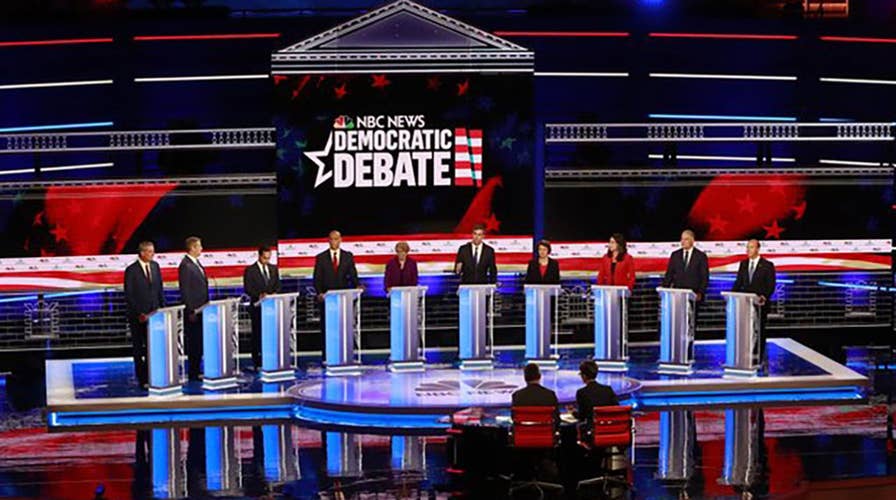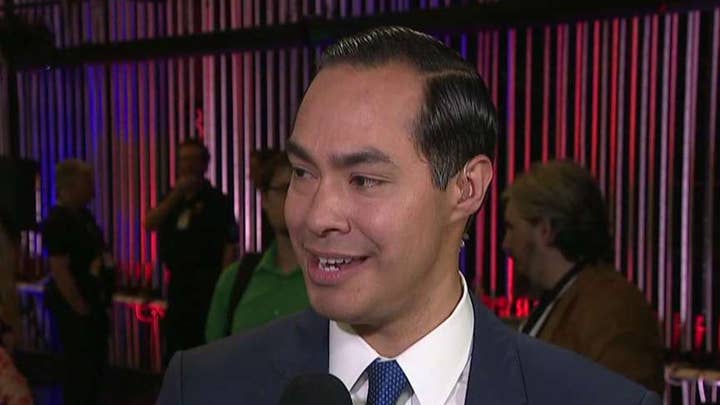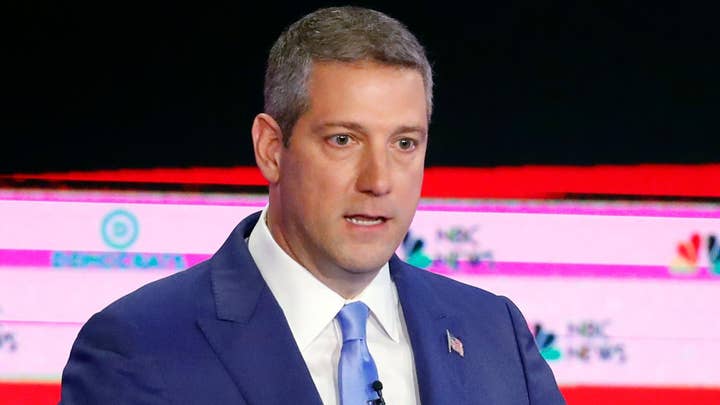How did voters react to the first night of Democratic presidential debates?
Maslansky and Partners president Lee Carter shares voter dials from the debate.
Democratic 2020 presidential hopefuls at the bottom of the crowded field had their moment to shine at their party’s first primary debate Wednesday -- using their time in the spotlight to push controversial policies and antagonize some of the more established candidates.
With top-tier candidates such as former Vice President Joe Biden, Sen. Bernie Sanders, I-Vt., and Sen. Kamala Harris, D-Calif., tapped for Thursday night’s debate, it gave some of those polling in low single digits their chance to grab the Democratic base’s attention on opening night, as they grappled with just a few top tier candidates such as Sen. Elizabeth Warren, D-Mass.
2020 DEMS CLASH ON 'MEDICARE-FOR-ALL,' IMMIGRATION AT DEBATE MARRED BY TECHNICAL DIFFICULTIES
Former Housing Secretary Julian Castro used much of his time to promote a far-left agenda on immigration, calling for the decriminalization of illegal border crossings and demanding his fellow presidential hopefuls join him in agreeing to repeal the relevant section of the Immigration and Nationality Act.
“I want to challenge all of the candidates to do that,” Castro said. “If you truly want to change the system then we have to repeal that section.”
As part of that, he called out former Texas Rep. Beto O’Rourke by name and said it was a “mistake” for him not to support that pledge. O’Rourke responding by arguing that in Congress he had worked to make sure asylum seekers at the southern border weren’t criminalized.
But Castro wasn’t satisfied, noting that many crossing the border aren’t seeking asylum and are simply "undocumented immigrants" and saying O'Rourke needed to read up on the matter.
“I think you should do your homework on this issue. If you did your homework on this issue you would know that we should repeal this section,” he said.
O’Rourke was similarly dinged by New York City Mayor Bill de Blasio when he said he would not replace private health insurance as part of a new health care reform.
“Private insurance is not working for tens of millions of Americans when you talk about the copays, the deductibles, the premiums, the out of pocket expenses, it’s not working,” de Blasio shot back. “How can you defend a system that’s not working?”
But while abolishing the private insurance of millions of Americans and decriminalizing illegal immigration may play well with a left-wing Democratic primary crowd, such promises could tie the hands of the eventual nominee if they adopt them to win the primary, and then try to pivot to the center to try and win a broader slice of the American electorate in key swing states.
But the pressure from the left-wing one percenters seems to be having an effect. Sen. Elizabeth Warren, D-Mass., the top-polling candidate on the debate stage, said this week that she backs decriminalizing illegal immigration, and on Wednesday was one of the candidates to raise their hand when asked who would abolish private insurance, along with de Blasio.
But the front-runners also face pressure from other, more centrist, longshot challengers. Rep. Tim Ryan, D-Ohio, urged his fellow Democrats to take a more moderate approach, and warned the party of appearing out of touch and “elitist.”
“We have a perception problem with the Democratic Party, we are not connecting with the working class people in the very states that I represent,” he said.
“We have to change the center of gravity in the Democratic Party from being coastal and elitist and Ivy League -- which is the perception -- to somebody from the forgotten communities that have been left behind for the last 30 years,” he said.
He also took a more hawkish approach to the question of American involvement in theaters of conflict abroad, and said the U.S. must remain “engaged” in Afghanistan. This sparked the ire of another longshot candidate -- the fiercely anti-war Rep. Tulsi Gabbard, D-Hawaii.
“Is that what you will tell the parents of those two soldiers who were just killed in Afghanistan?” she said. “‘Well, we just have to be engaged.’ As a soldier, I will tell you, that answer is unacceptable. We have to bring our troops home from Afghanistan.”
“I don't want to be engaged,” Ryan countered. “... But the reality of it is that if the United States doesn't engage, the Taliban will grow. And they will have bigger, bolder, terrorist acts. We have got to have some presence there.”
Gabbard, an Army National Guard veteran who served in Iraq, was herself a breakout star with her calls for the scaling back of U.S. military presence abroad. Google Trends data show that after the debate Gabbard was the most searched candidate in most states.
CLICK HERE TO GET THE FOX NEWS APP
While polling may indicate that there are many on the debate stage with little-to-no chance of eventually securing the nomination, the debate showed that those candidates can still have a significant impact on the way the race plays out, what policies the party adopts, and even who wins the race.
In 2016, Sen. Marco Rubio, R-Fla., was widely seen as one of the favorites for the nomination. But a bruising encounter with the lower polling former Nwe Jersey Gov. Chris Christie -- in which a rattled Rubio was caught repeating the same phrase multiple times as Christie called him out and mocked him -- hurt his image, and likely contributed to him eventually leaving the race.
Fox News' Brooke Singman and Lukas Mikelionis contributed to this report.














































